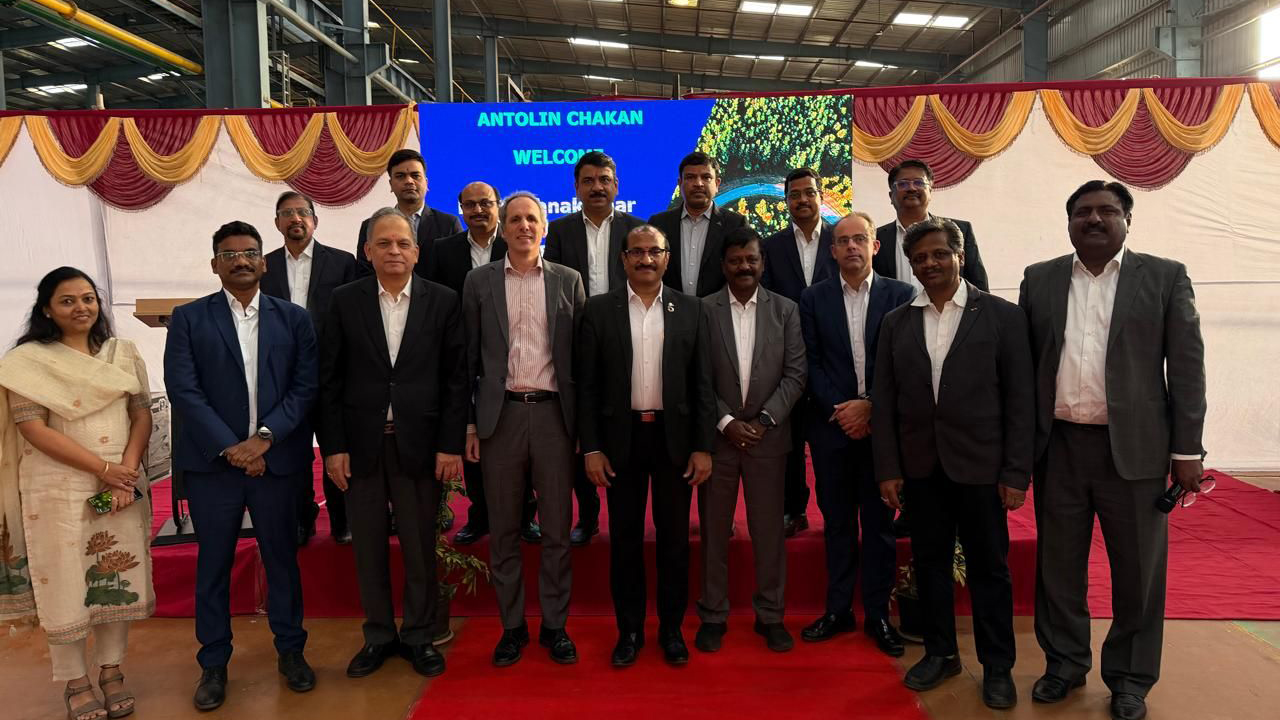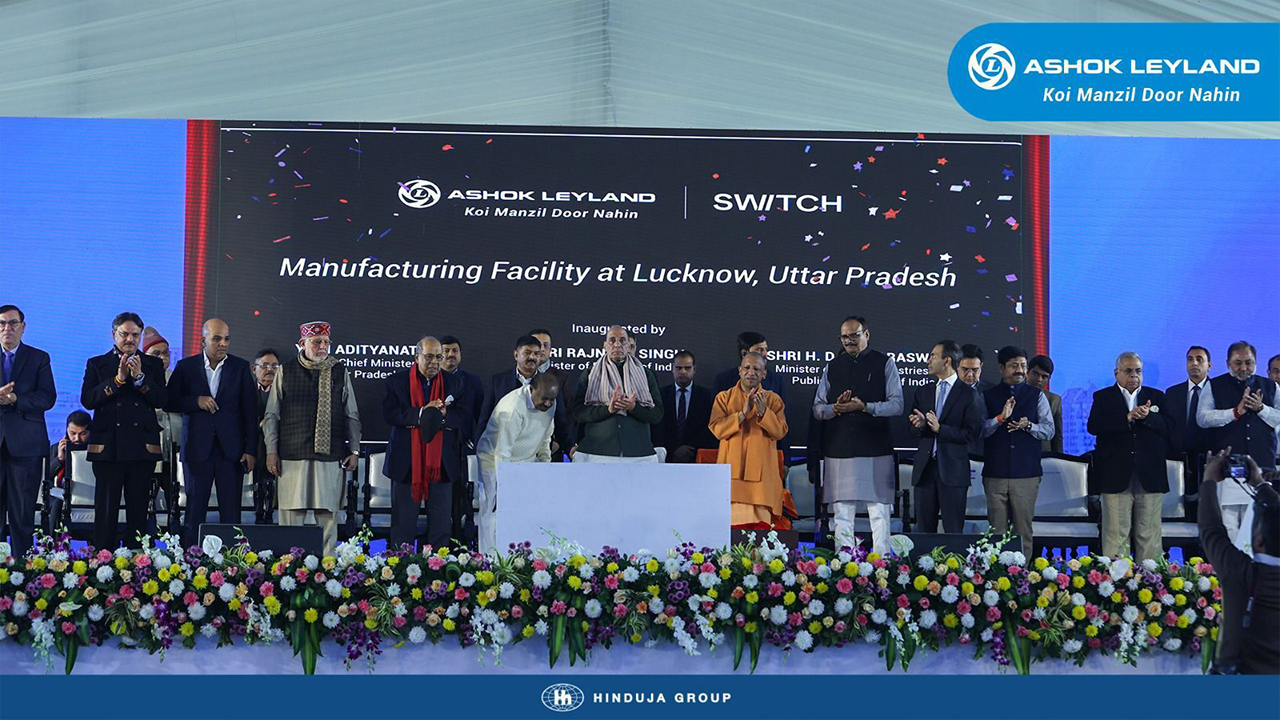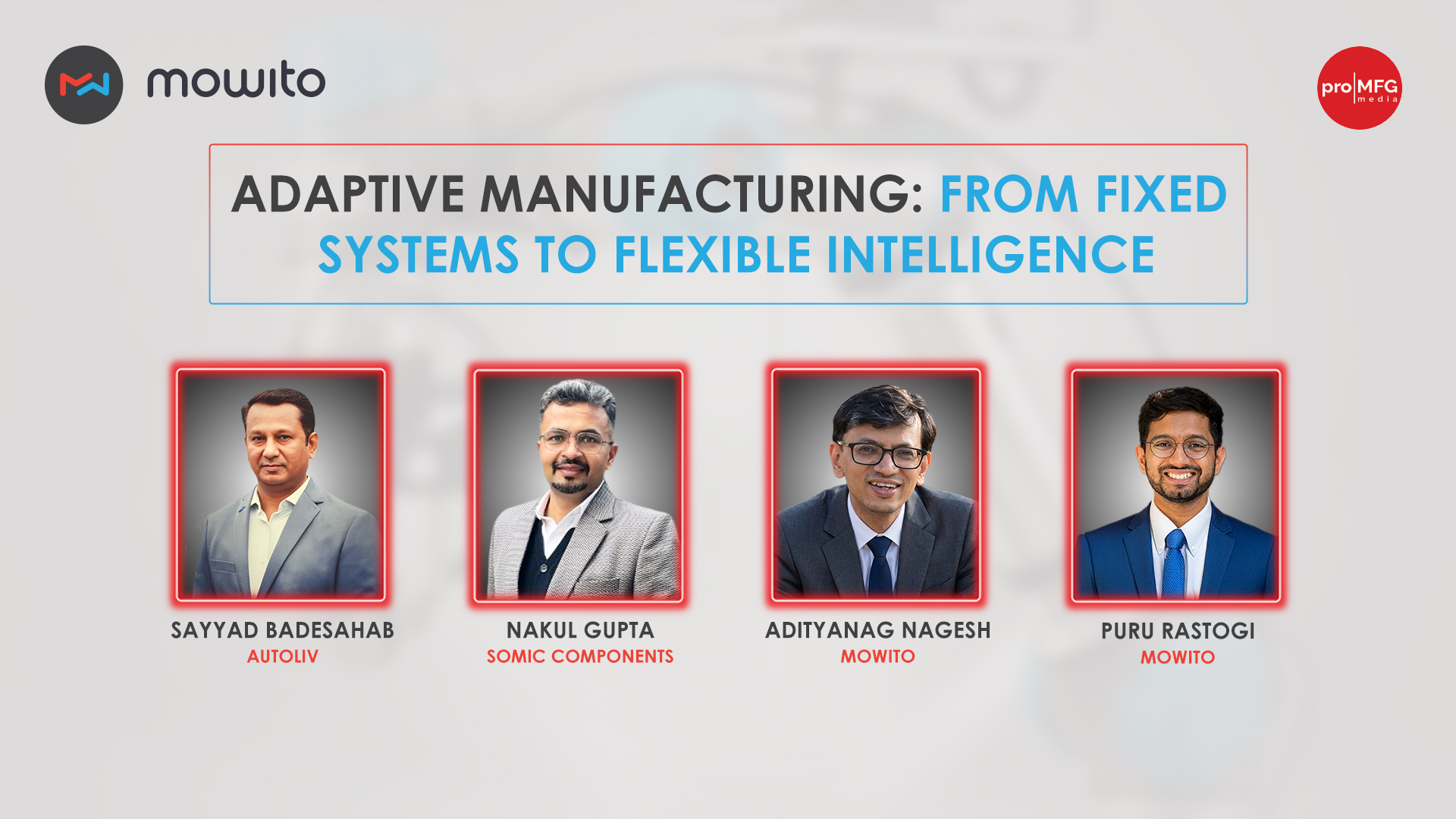In the Market, For the Market!
#ContinentalSurfaceSolutions #AcellaEco #LandryTchapda #AutomotiveInteriorsWith manufacturing presence here, we underline the importance that we are giving to the Indian automotive market. So yes, the Indian market is extremely important for us in every way.

In this conversation with Niranjan Mudholkar, Editorial Director, Pro MFG Media, Landry Tchapda, Head – Plant Management, Continental Surface Solutions India, explains that the core part of Continental’s strategy is to be in the market, for the market. ‘It means we want to be close to our customers and we want to serve them directly. That is the reason why we decided to come to India’.
Continental’s Surface Solutions business has plants around the globe in different countries like China, Germany, Poland, Spain, US, and Mexico. So what is the objective in having a plant in India and how does it compare to the other global plants?
Continental Surface Solutions as a business area has more than 300 years of existence and history. So, therefore, even though the first plant of Continental Surface Solutions was created in Hannover about three hundred years ago, during the course of the time, we have expanded into different markets and different regions with manufacturing presence. The core part of our strategy is to be in the market, for the market. It means we want to be close to our customers and we want to serve them directly. That is the reason why we decided to come to India.
Having an experience of more than 10 years in the Indian market through imports from different markets, we saw positive development in the potential of the Indian market. Therefore, we decided to set up the plant here. Our first intention is to deliver the customers that are present in the Indian market. We have implemented technologies that are similar to those used in 16+ plants that Continental Surface Solutions operates in 16+ locations globally. Of course, when we set up this plant, the intention was to implement the best technologies and the best systems available with us worldwide. Thus, the setup that we have here is supported by more than 300 years of experience. We have had several Greenfield projects from where we have learned. We have a benchmark in terms of machineries, in terms of systems and in terms of products. So what we are producing in Pune is having the same quality; well, in some cases, even higher quality compared to the products that we have in other markets. That is very important for us because even before coming to India, we have been importing the material from other markets. So, it means that the intention is to serve the market from the plant itself, with the same level of quality. Of course, with our local plant, not only can we serve our customers faster and better but we are also reducing the burdens that we had in the supply chain in terms of cost and environmental impact. India is a growing market for the automotive sector. So, with a variety of premium quality surface solutions, the offerings from this plant will certainly complement the industry growth.

Bird’s eye view of the Continental Surface Solutions Pune Plant
Continental Surface Solutions has been in the Indian market for over a decade now. So, has having your manufacturing footprint further enhanced your business?
Yes, indeed. I will not specify the individual names of customers but our presence compared to when we started here ten years back compared to the presence that we have today in the market has definitely improved in terms of the overall impact and the experience that the customers are getting now. We are receiving a lot of positive signs from our existing customers as well as potential customers and we are very, very optimistic for the future!
What kind of investment has been made in this plant?
We have invested around Rs.200 crore in this plant. Of course, the investment can be seen in different categories. For example, we have approximately 40,000 square metres of land that we have purchased. Out of that, today we have an office and production facility on approximately 14,000 square metres. This plant features best-in-class energy efficiency standards, sustainable production processes, an ergonomic work environment, 100 percent sewage and wastewater treatment, exhaust air treatment of all processes, and use of energy from renewable sources. We have a full operation setup here including admin, R&D centre, design centre, sales & service setup, warehouse, and of course, we have the factory itself with all the different processes starting from the mixing room going through the coating line, embossing, seating, and packaging. Then, we also have a laboratory where we are able to perform the testing on our products to make sure that we are meeting the customer requirements. We have a strong ERP system in place that connects all our different processes and functions. It allows us complete visibility and enables faster decision making. Of course, Industry 4.0 is playing a big role today. Due to the Covid situation, people were not able to travel. So, we had to find methods of communicating with our customers and suppliers that we were not able to meet physically. Hence, digitalization has also been a big focus for us at this plant.

Office and production facility cover about 14,000 square metres of the total Plant area.
Does the Pune Surface Solutions Plant offer the complete range of Continental’s Surface Solutions business in India?
In the first stage, the Pune Plant will mainly manufacture Acella Eco, which adds aesthetic value to vehicle interiors. Compared to natural leather, it is more durable, innovative, easy to maintain, economical and sustainable. For the next phase, we also have plans to produce eco-friendly foam foil Yorn and Yorn Light at this plant. Yorn Light is truly light weight and thus can contribute to the overall weight reduction of the car too.
What does Continental Surface Solutions having a full-fledged plant here in India mean for the Indian automotive industry?
Everywhere we go, we try to be the pioneer in the market segments; we try to set new benchmarks, bring new products and introduce new ways of manufacturing. Basically, we bring the best of the systems, best of the technology and best of the resources to the local market. So, Continental Surface Solutions having a full-fledged plant here in India means that today we are able to serve our customers directly in the market with a high level of quality. It is always our commitment to bring the right products for our customers. With local presence, we are also able to drastically reduce the supply chain burden and that not only makes us more efficient and faster in serving our customers but it also means that we are more Green. Talking specifically about the Pune plant, we are now just four hours away from all our main customers. In fact, with this plant, we are covering the complete Indian automotive market including NCR, Gujarat and Chennai.

A view of the warehouse inside the Plant
How important is the Indian market from the global perspective for Continental Surface Solutions?
Our plant in Pune is the latest plant we have and it clearly shows that we are focused on this market now more than before. In fact, we have built this plant in such a way that we can even quadruple our existing capacity in the future. We are aware that in terms of competitiveness, the Indian automotive market is the fifth largest market in the world. With manufacturing presence here, we underline the importance that we are giving to the Indian automotive market. So yes, the Indian market is extremely important for us in every way.
Would you also be looking at this plant as an export hub?
When we say in the market, for the market, the Indian market is the number one priority for us. But, we are also open to export to the ASEAN markets, and some of the neighbouring countries to where we will supply from this plant.
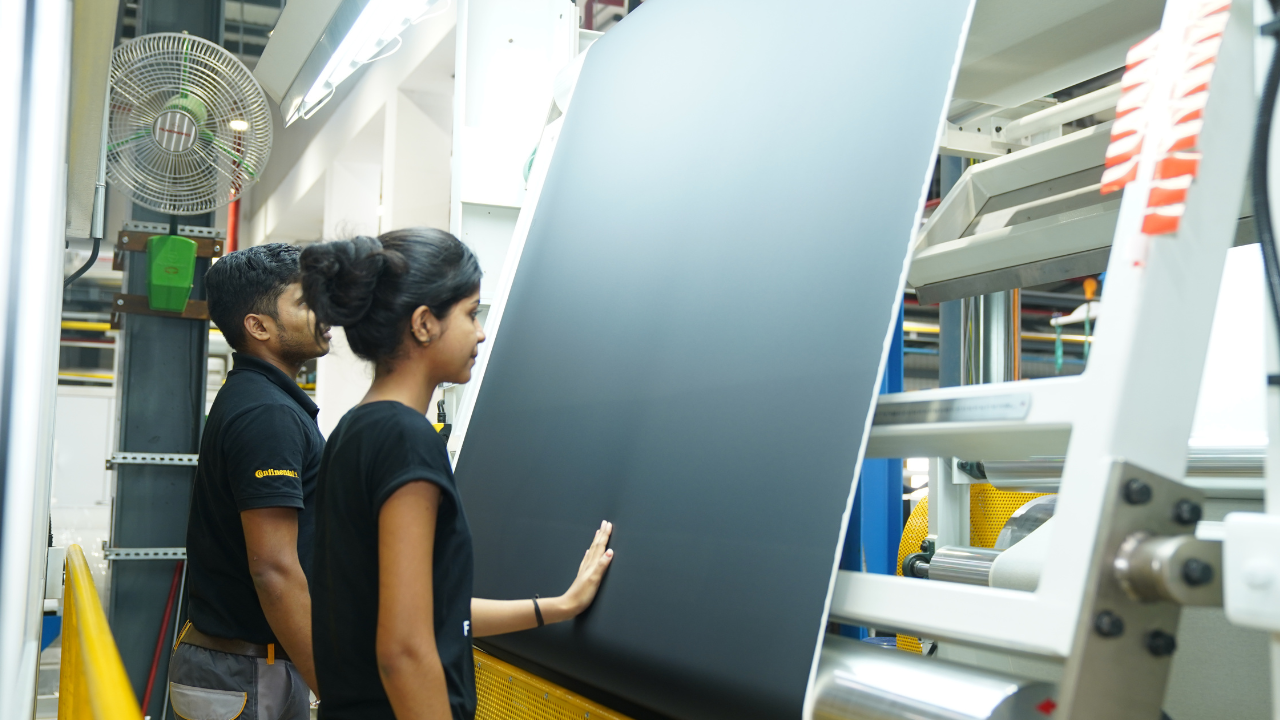
Approximately 30 percent of the Plant’s workforce includes females
There’s a lot of focus on inclusivity and diversity across businesses today. What is the Pune plant doing on that aspect?
To start with, approximately 30 percent of our workforce includes females and that’s true not just in the office area but also on the shop floor. In fact, the number of women employees on the shop floor is higher compared to the number in the office area. That is good!
Also, while setting up the plant, we have paid attention to ergonomics to make sure that in the areas of manual work, the physical impact on the employees is as little as possible. The inclusive culture that you mentioned is something that we just do across all our plants; it’s a given. Of course, we understand that it also comes with its challenges. Nevertheless, we can only sustain it if we believe in it and if we do it every single day. It also means giving opportunities to people, when we see the qualification, irrespective of their gender or social background.
My last question is from a personal point of view. How do you find your stay in India?
It has been fantastic! My journey in India started four years ago. And after four years, I am still here! And I am very happy being here! So, setting up this plant from scratch has been a big challenge and a great opportunity. I have enjoyed every bit of it and it has also been a huge learning experience. A plant is not about the building or the systems or the equipment; it is about the people. And we have been really privileged to have such talented and wonderful people in our plant. They have been supporting this project, working day and night. And, of course, with the great support of all the colleagues, the adoption and integration for me and for my family has been happy and comfortable.
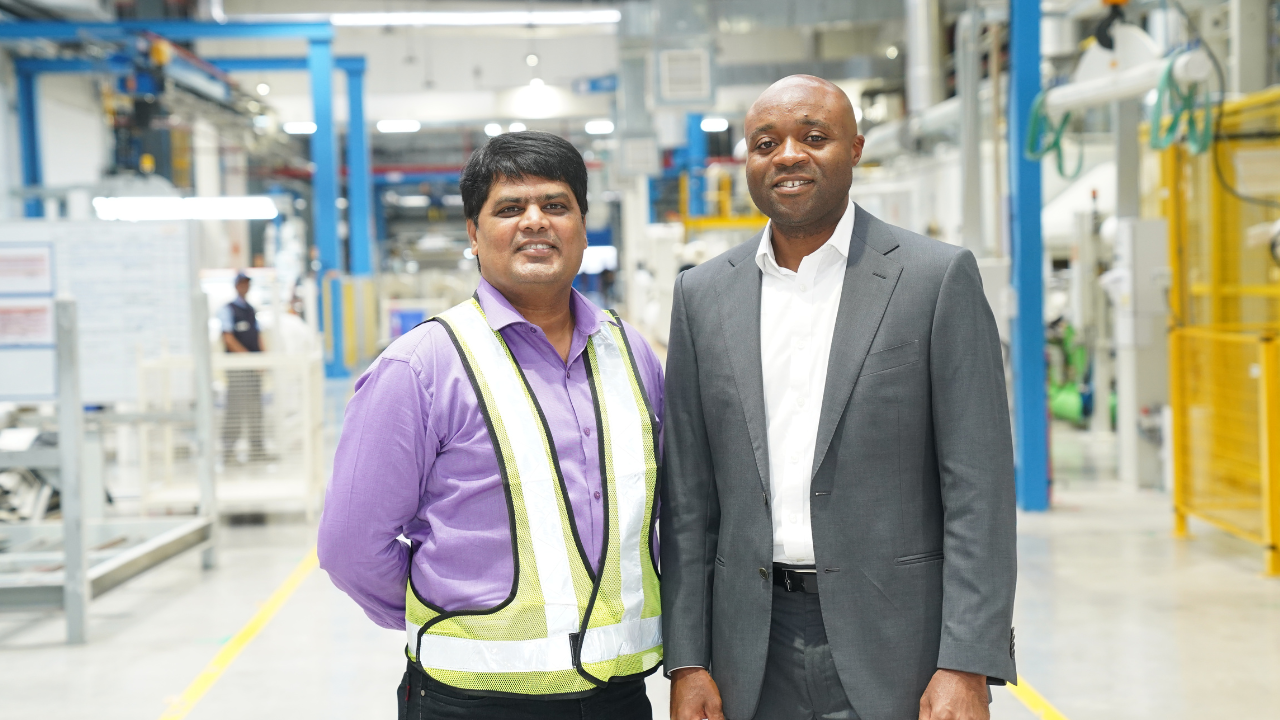
Pro MFG’s Niranjan Mudholkar with Continental’s Landry Tchapda on the Pune Plant’s Shopfloor
About Landry Tchapda: Landry, who has been associated with Continental for the past 10 years, joined in 2012 as the key account manager for Benecke-Hornschuch Surface Group. Gradually raised through the ranks and served as senior key account manager of Benecke-Hornschuch Surface Group, between 2016 and 2018. In 2018, he was deputed to India to head the greenfield project in Pune, of Surface Solutions business unit. After the successful completion of the project, he continues in his role as the Head of Plant Management.
NEWSLETTER
TRENDING ON PRO MFG
MORE FROM THE SECTION




